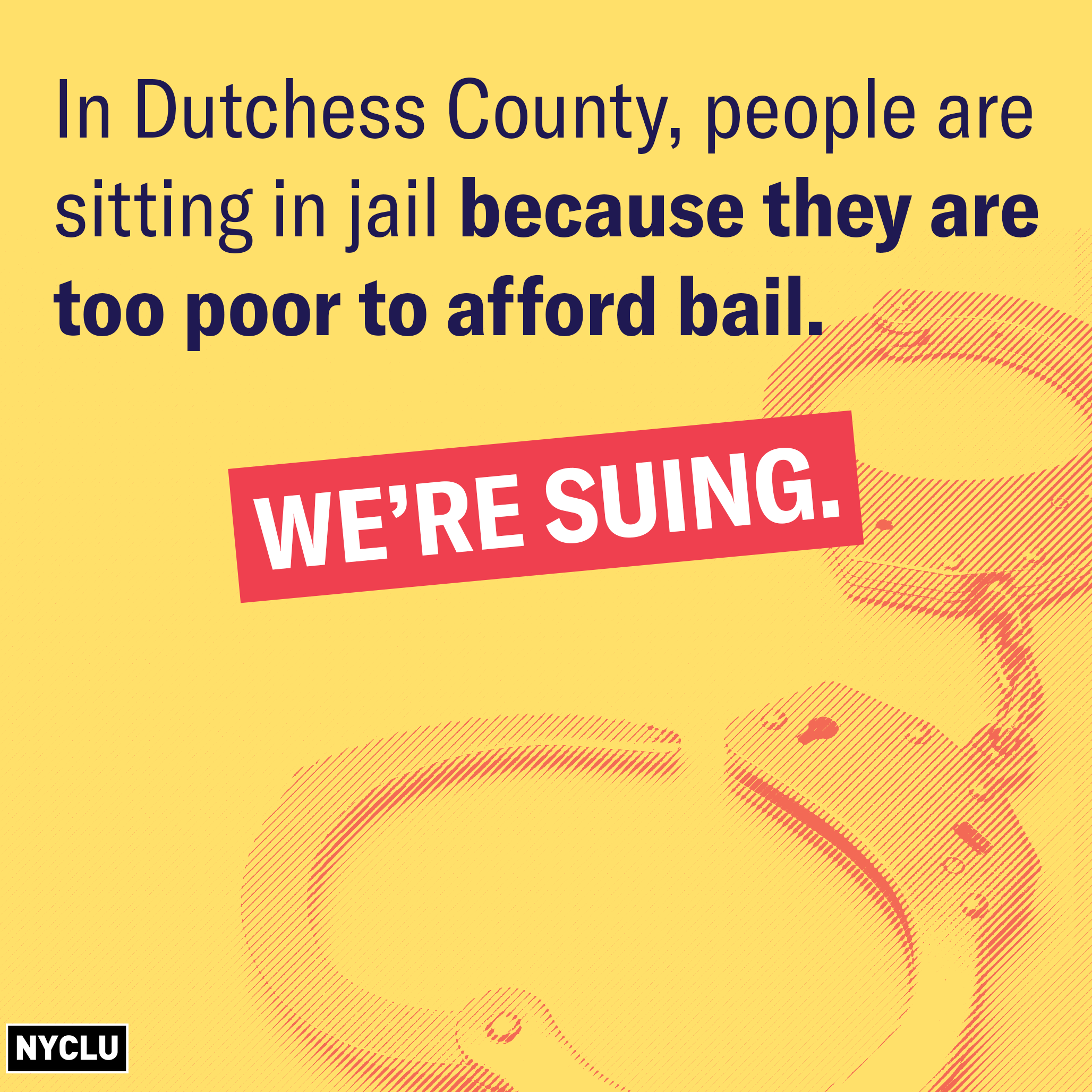In a lawsuit filed today, the New York Civil Liberties Union challenged the imposition of cash bail when a judge has not considered a person’s ability to pay or alternatives to money bail. The lawsuit was filed on behalf of Dutchess County resident Christopher Kunkeli, who has spent three months in jail before trial on a petit larceny charge because his $5,000 bail is nearly half of his annual income.
The U.S. Supreme Court has held that imprisoning someone solely because of their poverty violates the Fourteenth Amendment’s guarantees of equal protection and due process. Yet tens of thousands of New Yorkers like Kunkeli who cannot afford bail are deprived of their freedom each year. The NYCLU is seeking a ruling that could set standards for state courts that would lead to large reductions in the numbers of New Yorkers held before trial.
“Mr. Kunkeli is one of the thousands of New Yorkers each year who, though presumed innocent, remain behind bars because they don’t have means,” said Donna Lieberman, the executive director of the New York Civil Liberties Union. “Justice should not depend on the size of your bank account. The courts have a responsibility to consider defendants’ financial circumstances.”
New York’s bail statute allows judges to consider alternatives to restrictive forms of bail, such as unsecured and partially-secured bond, as well as pretrial release services, which are available in most counties and have been successful at ensuring participants appear in court. The judge in Mr. Kunkeli’s case set his $5,000 bail and $10,000 bond without considering Kunkeli’s ability to pay, and ordered him jailed in Dutchess County when he could not. Kunkeli was initially arrested on October 10 of last year, accused of shoplifting a vacuum cleaner from Target.
“Five thousand dollars is standing between me and my freedom,” said Mr. Kunkeli. “Because I can’t afford to buy my way out of jail, I couldn’t spend time with my friends and family over the holidays.”
There is a growing nationwide consensus in support of bail reform, as states from New Jersey to Kentucky, and now New York, take steps to enact significant changes to their bail practices. Last week, during his State of the State address, Gov. Cuomo called for eliminating cash bail for low-level offenses.
“The thousands of New Yorkers languishing in jail before trial can’t wait for the possibility that Albany will act,” said Philip Desgranges, NYCLU senior staff attorney. “A ruling in this case would not only provide immediate relief to Mr. Kunkeli, but would begin a process that would help thousands across the state who are denied their freedom solely because of their inability to pay.”
Dutchess County demonstrates why cash bail practices are one of the leading drivers of mass incarceration. People who had not yet been to trial accounted for 71 percent of the county’s jail population in 2016. Between 2010 and 2017, 63 percent were there for misdemeanors or violations. They spent an average of 32 days behind bars for misdemeanor offenses and 16 days for mere violations, like disorderly conduct. Between 2010 and 2017, nearly 700 people were detained for one week or more on just $500 bail. Dutchess County’s bail practices have led to overcrowded jails, with defendants jailed in nearby trailers.
“Even a few days in jail, let alone weeks or months, can mean missed home payments and child support, or even evictions and lost jobs,” said Shannon Wong, director of the Lower Hudson Valley Chapter of the New York Civil Liberties Union. “Cash bail practices have led to overcrowded jails and upended lives in Dutchess County. Our neighbors, and all New Yorkers deserve a presumption of innocence and equal justice. These consequences impact individuals and families for years afterward.”
The NYCLU suit seeks a ruling that will have the broader impact of ending New York’s widespread practice of jailing the poor solely because of their poverty.
In addition to Desgranges, NYCLU staff on the case include Legal Director Arthur Eisenberg, associate legal director Christopher Dunn, senior staff attorney Molly Kovel, legal fellow Kristen Burzynski, paralegal Maria Rafael, legal investigator Paula Garcia-Salazar, data and policy analyst Michelle Shames, and former intern Nina Monfredo.
